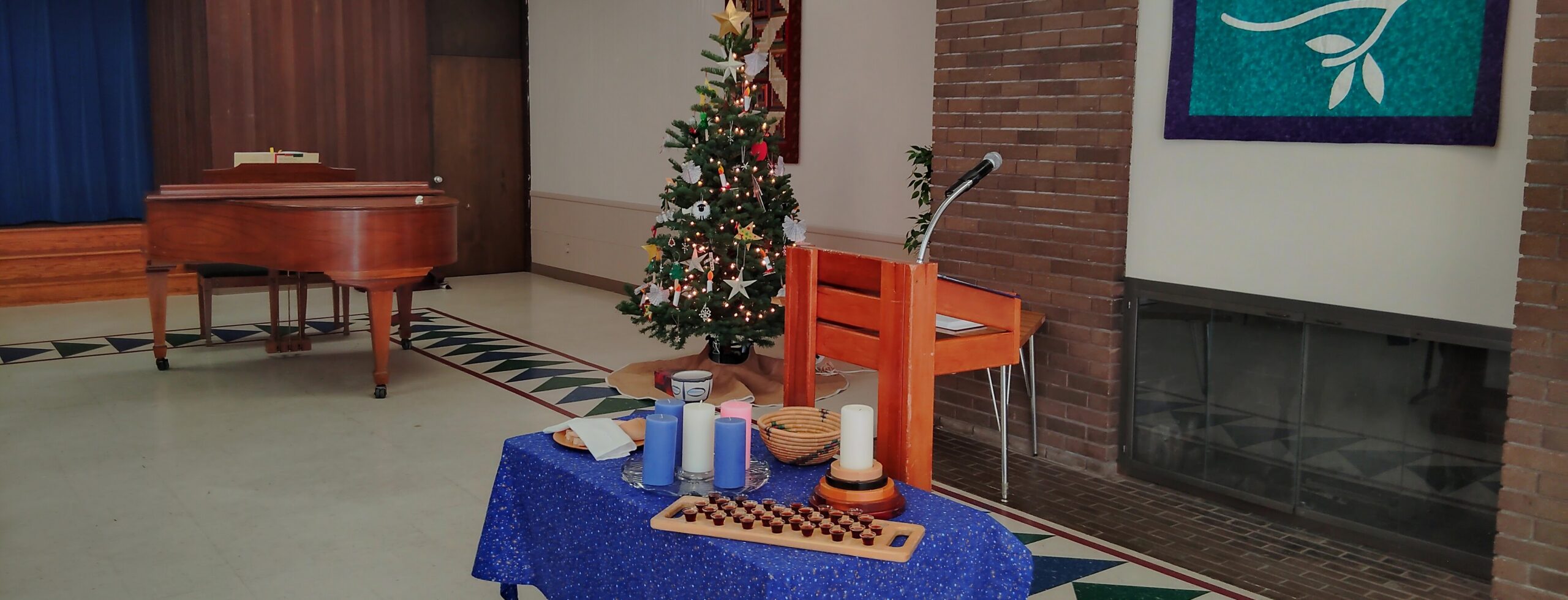
Practicing Hope
Texts: Daniel 6:6-27, Luke 1:5-20
It’s Advent! This is a season of waiting and wonder. A season of anticipation. A season of hope. Today in particular, the tradition of the church is the Sunday to reflect on hope; subsequent Sundays will focus on Peace, Joy and Love. But I have heard from many people that a word of hope is much needed at the moment. I came prepared.
It feels a little weird to start Advent with a story from the Old Testament – particularly Daniel. Because what does the lion’s den have to do with the coming of Christmas, or even with hope? The narrative lectionary is a little wonky that way. It really sticks to the Hebrew Bible right up until Christmas. So that’s why I added in the story of Zechariah and Elizabeth.
The two stories also might seem like they have nothing to do with each other. But there was something that stuck out to me right away. Like a neon sign almost: tyranny and empire. Both stories immediately mention a king and his kingdom. Luke does this as context setting; Herod doesn’t come into the story quite yet as a character. In Daniel King Darius is a major player.
Each of these stories is overshadowed by empire. For Daniel in exile and for Elizabeth and Zechariah under occupation, they are people under the power of a foreign government. In times when people have the least power is the time when hope may be the hardest – and also the most necessary.
While neither story talks explicitly about hope, I see the hope that’s inherent in the way these characters live. It’s hope as a faithful practice. Hope as consistent presence. We tend to think about hope like it’s an emotion. We feel hopeful. But the abolitionist activist Miriame Kaba talks about hope as a discipline. She compares it to patience, which is also something that needs to be practiced – and also something relevant to Advent.
Kaba says this about hope, writing with Kelly Hayes:
When we talk about hope in these times, we are not prescribing optimism. Rather, we are talking about a practice and a discipline… To practice active hope, we do not need to believe that everything will work out in the end. We need only decide who we are choosing to be and how we are choosing to function in relation to the outcome we desire, and abide by what those decisions demand of us.
This practice of hope does not guarantee any victories against long odds, but it does make those victories more possible. Hope, therefore, is not only a source of comfort to the afflicted but also a strategic imperative.
(Hope Is a Practice and a Discipline: Building a Path to a Counterculture of Care by Kelly Hayes and Mariame Kaba)
I believe this is the kind of hope that Daniel and Zechariah both demonstrate in their respective lives within empire. They are both men who are faithful in their spiritual practice. Daniel in particular is described as faithful to his prayer practice – praying three times a day – and faithful in his service to the king and court.
I had forgotten that there’s more than one king in Daniel. I think of Nebuchadnezzar as the king from that story. I think because as a kid hearing that story it felt like a tongue twister – that and Shadrach, Mishach and Abednego. Nebuchadnezzar was the king at the beginning of the story. By this time in the narrative (and I guess in history?) Nebuchadnezzar was ousted and in our story today it’s king Darius that’s featured.
Daniel has faithfully served both kings as an advisor and dream interpreter. He’s just a dependable and steadfast civil servant. But Darius is new to kinging and he has surrounded himself with yes-men and sycophants. And with Darius flattery will get you everywhere. So when his new power-hungry advisors tell him that he needs to pass a law that says all petitions to the Divine need to be addressed to him (he’s like a god, after all) he agrees!
And even knowing this, Daniel’s faithful practice persists. And gets him thrown into a pit of lions. He must have been completely terrified. But if he had any hope at all it was in the God to whom he had so faithfully prayed. Hope based on the relationship grounded in practice. Hope that was rewarded by the protection of God’s messengers.
When a messenger appeared to Zechariah the circumstances were much different, of course. Zechariah was in the temple, not threatened by hungry lions. But he was in the midst of his faithful service. And the visit revived his hope…a hope that would ultimate lead to the birth of John, who made the way for Jesus’s ministry, opening the way for God’s reign among us.
It is so easy to lose hope. The feeling. And it may be difficult to practice hope as a discipline. But we are in it together. We encourage each other – it’s the reason that I find it impossible to work out by myself – I need people to practice and be accountable and encourage each other. May we commit this Advent season to turn toward hope as a discipline that we practice, so that we may experience the peace, joy and love that come with Christ.
–
One of the faithful practices of hope in our tradition is the Lord’s Supper. When we eat and drink together the meal that Jesus instituted, we proclaim Jesus present in our midst, we reaffirm our connection to the body of Christ the church, and we recommit to following his way of peace. It feels good and right to celebrate together as an act of hope as we turn toward the coming Christ, anticipating Jesus’ birth.
—
